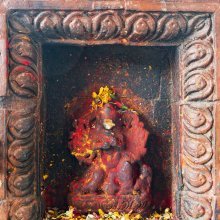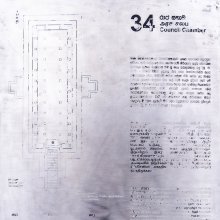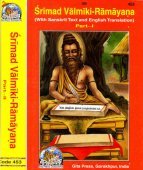Mata, Mātā, Matā, Maṭā: 22 definitions
Introduction:
Mata means something in Buddhism, Pali, Hinduism, Sanskrit, Jainism, Prakrit, the history of ancient India, Marathi, Hindi, Tamil. If you want to know the exact meaning, history, etymology or English translation of this term then check out the descriptions on this page. Add your comment or reference to a book if you want to contribute to this summary article.
Images (photo gallery)
(+6 more images available)
In Hinduism
Shaktism (Shakta philosophy)
Source: Google Books: Lalita SahasranamaMātā means mother. The prefix Śrī is important here. Śrī (श्री) represents the highest form of motherhood. The human mothers can take care of their children with love and affection. But they cannot remove the miseries and sufferings of their loved ones, which they are destined to undergo.

Shakta (शाक्त, śākta) or Shaktism (śāktism) represents a tradition of Hinduism where the Goddess (Devi) is revered and worshipped. Shakta literature includes a range of scriptures, including various Agamas and Tantras, although its roots may be traced back to the Vedas.
Purana and Itihasa (epic history)
Source: archive.org: Shiva Purana - English TranslationMata (मत) refers to the “point of view” (of a particular system of philosophy), according to the Śivapurāṇa 2.3.13 (“Śiva-Pārvatī dialogue”).—Accordingly, after Pārvatī spoke to Śiva: “On hearing these words of Pārvatī based on the Sāṃkhya system, Śiva replied to her, upholding the Vedāntin’s point of view [i.e., vedānta-mata-saṃstha].—[...]”.
Source: Cologne Digital Sanskrit Dictionaries: The Purana Index1) Matā (मता).—A goddess enshrined at Pārāvārataṭa.*
- * Matsya-purāṇa 13. 44.
2a) Mātā (माता).—Is Lalitā; the goddess enshrined at Siddhapura, and at Kāyārohaṇa.*
- * Brahmāṇḍa-purāṇa IV. 29. 44, 142; Matsya-purāṇa 13. 46, 48.
2b) The daughter of Ṛṣā; gave birth to Grahas, Anujyeṣṭakas, Niṣkas, and Śiśumāras;1 different fishes; (the word reads mīnā by mistake.)2

The Purana (पुराण, purāṇas) refers to Sanskrit literature preserving ancient India’s vast cultural history, including historical legends, religious ceremonies, various arts and sciences. The eighteen mahapuranas total over 400,000 shlokas (metrical couplets) and date to at least several centuries BCE.
Ayurveda (science of life)
Nighantu (Synonyms and Characteristics of Drugs and technical terms)
Source: WorldCat: Rāj nighaṇṭu1) Mātā (माता) is another name for Ākhukarṇī, a medicinal plant identified with Ipomoea reniformis, synonym of Merremia emarginata (kidney leaf morning glory) from the Convolvulaceae or “morning glory family” of flowering plants, according to verse 3.67-68 of the 13th-century Raj Nighantu or Rājanighaṇṭu. The third chapter (guḍūcyādi-varga) of this book contains climbers and creepers (vīrudh). Together with the names Mātā and Ākhukarṇī, there are a total of twenty Sanskrit synonyms identified for this plant.
2) Mātā (माता) is also mentioned as a synonym for Indravāruṇī, a medicinal plant identified with Citrullus colocynthis (colocynth, bitter apple or desert gourd) from the Cucurbitaceae or “gourd family” of flowering plants, according to verse 3.70-72.
3) Mātā (माता) is also mentioned as a synonym for Mahāśrāvaṇī, an unidentified medicinal plant, according to verse 5.19-21. The fifth chapter (parpaṭādi-varga) of this book enumerates sixty varieties of smaller plants (kṣudra-kṣupa). Together with the names Mātā and Mahāśrāvaṇī, there are a total of eight Sanskrit synonyms identified for this plant.

Āyurveda (आयुर्वेद, ayurveda) is a branch of Indian science dealing with medicine, herbalism, taxology, anatomy, surgery, alchemy and related topics. Traditional practice of Āyurveda in ancient India dates back to at least the first millenium BC. Literature is commonly written in Sanskrit using various poetic metres.
Yoga (school of philosophy)
Source: ORA: Amanaska (king of all yogas): A Critical Edition and Annotated Translation by Jason BirchMata (मत) refers to “opinions”, according to the Haṭhapradīpikā of Svātmārāma: an influential 15th-century Sanskrit manual on Hatha-Yoga dealing with techniques to channel one’s vital energy.—Accordingly, “The compassionate Svātmārāma presents the Haṭhapradīpikā for those ignorant of Rājayoga because of their confusion in the darkness of many [conflicting] opinions (bahu-mata)”.

Yoga is originally considered a branch of Hindu philosophy (astika), but both ancient and modern Yoga combine the physical, mental and spiritual. Yoga teaches various physical techniques also known as āsanas (postures), used for various purposes (eg., meditation, contemplation, relaxation).
In Buddhism
Tibetan Buddhism (Vajrayana or tantric Buddhism)
Source: academia.edu: The Structure and Meanings of the Heruka MaṇḍalaMātā (माता) is the name of a Ḍākinī who, together with the Vīra (hero) named Māta forms one of the 36 pairs situated in the Agnicakra, according to the 10th century Ḍākārṇava chapter 15. Accordingly, the agnicakra refers to one of the three divisions of the saṃbhoga-puṭa (‘enjoyment layer’), situated in the Herukamaṇḍala. The 36 pairs of Ḍākinīs [viz., Mātā] and Vīras are red in color; they each have one face and four arms; they hold a skull bowl, a skull staff, a small drum, and a knife.

Tibetan Buddhism includes schools such as Nyingma, Kadampa, Kagyu and Gelug. Their primary canon of literature is divided in two broad categories: The Kangyur, which consists of Buddha’s words, and the Tengyur, which includes commentaries from various sources. Esotericism and tantra techniques (vajrayāna) are collected indepently.
In Jainism
General definition (in Jainism)
Source: archive.org: TrisastisalakapurusacaritraMātā (माता) refers to “mother” and represents one of the eight classes of female ancestors entitled to śrāddha.—(The 5 samitis and 3 guptis are compared to the eight ‘mothers’).—Cf. Saṃskārakaustubhaprārambha, p. 24a, line 4.

Jainism is an Indian religion of Dharma whose doctrine revolves around harmlessness (ahimsa) towards every living being. The two major branches (Digambara and Svetambara) of Jainism stimulate self-control (or, shramana, ‘self-reliance’) and spiritual development through a path of peace for the soul to progess to the ultimate goal.
India history and geography
Source: Cologne Digital Sanskrit Dictionaries: Indian Epigraphical GlossaryMata.—cf. guru-mata (CII 1), ‘a matter considered to be serious’. (LP), a signature; cf. the use of the word with the signature as in mataṃ mama amukasya found copied in many copper-plate grants. Note: mata is defined in the “Indian epigraphical glossary” as it can be found on ancient inscriptions commonly written in Sanskrit, Prakrit or Dravidian languages.

The history of India traces the identification of countries, villages, towns and other regions of India, as well as mythology, zoology, royal dynasties, rulers, tribes, local festivities and traditions and regional languages. Ancient India enjoyed religious freedom and encourages the path of Dharma, a concept common to Buddhism, Hinduism, and Jainism.
Languages of India and abroad
Pali-English dictionary
Source: BuddhaSasana: Concise Pali-English Dictionarymata : (pp. of maññati) know; understand. (pp. of marati), died. (nt.) a view. (pp. of marati) dead.
Source: Sutta: The Pali Text Society's Pali-English Dictionary1) Mata, 2 (pp. of marati, mṛ) dead M. I, 88 (ekāha° dead one day); III, 159 (matam eyya would go to die); Sn. 200, 440; J. V, 480. Neg. amata see separate article.—Note. mata at PvA. 110 is to be corrected into cuta.
2) Mata, 1 (pp. of maññati) thought, understood, considered (as=—°), only late in use Vbh. 2 (hīna° paṇīta°, doubtful reading); Sdhp. 55; Mhvs 25, 55 (tassā matena according to her opinion); 25, 110 (pasu-samā matā, pl. considered like beasts). Cp. sam°.—Note. Does mata-sāyika at Th. 1, 501 (=Miln. 367) belong under this mata? Then mata would have to be taken as nt. meaning “thought, thinking, ” but the phrase is not without objection both semantically & syntactically. Mrs. Rh. D. (Brethren, p. 240) translates “nesting-place of thought. ” (Page 517)

Pali is the language of the Tipiṭaka, which is the sacred canon of Theravāda Buddhism and contains much of the Buddha’s speech. Closeley related to Sanskrit, both languages are used interchangeably between religions.
Marathi-English dictionary
Source: DDSA: The Molesworth Marathi and English Dictionarymata (मत).—n (S) Opinion, sentiments, judgment, mind. 2 Particular tenets or dogmata: also a sect, persuasion, party (in religion or in philosophy): also, specifically, a heresy or a heretical body. Ex. jēṇēṃ matēṃ ucchēduni samasta || śuddha mārga vāḍhavilā ||. āpalyā matānēṃ or matēṃ Of one's own accord or mind.
--- OR ---
māta (मात).—f ( P) A term at chess. Checkmate. 2 (Poetry.) An exploit, achievement, feat; a prodigy of valor; a deed of wonder. Ex. aika bāī sāṅgatē māta tyācī ||. 3 (Poetry.) An affair; a business or matter; an event or occurrence. Ex. kaṭakīcī māta sāṅga jāsudā gharānta ||; also nagarīṃ phuṭalī māta || vanāsiṃ jātā raghuvīra || varṣalā yēkaci ākānta ||. v uṭha, uḍa, & uṭhava, uḍava. 4 In lax and familiar phraseology. Eclat, splendor, gloriousness, glare and glitter; a brilliant and dazzling display or execution. Ex. gāṇyācī māta, jēvaṇyācī māta, pra- yōjanācī māta, lagnācī māta. 5 Exuberance, copiousness, cheapness; astonishing facility of obtaining. Ex. ghānyācī māta, sākharīcī māta, jinasācī māta
--- OR ---
mātā (माता).—f (S) A mother. 2 The personified energy of a deity, his wife. In comp mātṛ is the form, as mātṛkula, mātṛgōtra.
Source: DDSA: The Aryabhusan school dictionary, Marathi-Englishmata (मत).—n Opinion. A sect.
--- OR ---
māta (मात).—f An exploit. An affair; êclat. Exu- berance.
--- OR ---
mātā (माता).—f A mother. mātāpitara n Parents.
Marathi is an Indo-European language having over 70 million native speakers people in (predominantly) Maharashtra India. Marathi, like many other Indo-Aryan languages, evolved from early forms of Prakrit, which itself is a subset of Sanskrit, one of the most ancient languages of the world.
Sanskrit dictionary
Source: DDSA: The practical Sanskrit-English dictionaryMata (मत).—p. p. [man-kta]
1) Thought, believed, supposed; स मे युक्ततमो मतः (sa me yuktatamo mataḥ) Bhagavadgītā (Bombay) 6.47.
2) Considered, regarded, deemed, looked upon.
3) Esteemed, honoured, respected; बभौ च सा तेन सतां मतेन श्रद्धेव साक्षाद्विधिनोपपन्ना (babhau ca sā tena satāṃ matena śraddheva sākṣādvidhinopapannā) R.2.16;8.8.
4) Commended, valued.
5) Conjectured, guessed.
6) Meditated upon, thought of, perceived, recognised.
7) Thought out.
8) Intended, aimed at.
9) Approved, sanctioned.
1) Wished or hoped for.
11) Perceived, observed, known, understood. (See man).
-tam 1 A thought, idea, opinion, belief, view; निश्चितं मतमुत्तमम् (niścitaṃ matamuttamam) Bhagavadgītā (Bombay) 18.6; केषांचिन्मतेन (keṣāṃcinmatena) &c.
2) Doctrine, tenet, creed, religious belief; ये मे मतमिदं नित्यमनुतिष्ठन्ति मानवाः (ye me matamidaṃ nityamanutiṣṭhanti mānavāḥ) Bhagavadgītā (Bombay) 3.31.
3) Advice, instruction, counsel.
4) Aim, design, intention, purpose; आत्मप्रभावेण मुने ज्ञातुमर्हसि मे मतम् (ātmaprabhāveṇa mune jñātumarhasi me matam) Rām.7. 9.19.
5) Approbation, sanction, commendation.
6) Knowledge.
--- OR ---
Mātā (माता).—A mother.
Source: Cologne Digital Sanskrit Dictionaries: Shabda-Sagara Sanskrit-English DictionaryMata (मत).—mfn.
(-taḥ-tā-taṃ) 1. Known, understood. 2. Admitted, believed, held or entertained, (as opinion, &c.) 3. Respected, reverenced, minded, regarded. n.
(-taṃ) 1. Purpose, intention, wish, mind, (as to have a mind to any thing.) 2. Knowledge. 3. Doctrine, tenet, belief, opinion. 4. Counsel, advice. 5. Design, aim. 6. Approbation. E. man to mind, aff. kta .
Source: Cologne Digital Sanskrit Dictionaries: Cappeller Sanskrit-English DictionaryMata (मत).—[adjective] thought, believed, supposed; considered as, taken for ([nominative] & [adverb]); esteemed, honoured, approved or liked by ([genetive]); intended, designed; known, understood.
Source: Cologne Digital Sanskrit Dictionaries: Monier-Williams Sanskrit-English Dictionary1) Maṭa (मट):—m. ([Prakrit] for mṛta) the son of a Vaiśya and a Kuṭi, [cf. Lexicographers, esp. such as amarasiṃha, halāyudha, hemacandra, etc.]
2) Mata (मत):—a mataṃ-ga etc. See under √man, p. 783, col. 1.
3) [from man] b mfn. thought, believed, imagined, supposed, understood, [Ṛg-veda] etc. etc.
4) [v.s. ...] regarded or considered as, taken or passing for ([nominative case] or [adverb]), [Manu-smṛti; Mahābhārata] etc.
5) [v.s. ...] thought fit or right, approved, [Yājñavalkya; Kāvya literature; Kāmandakīya-nītisāra]
6) [v.s. ...] honoured, esteemed, respected, liked (with [genitive case] [Pāṇini 3-2, 188]), [Raghuvaṃśa; Kāmandakīya-nītisāra]
7) [v.s. ...] desired, intended, [Rāmāyaṇa]
8) [v.s. ...] m. Name of a son of Śambara, [Harivaṃśa] ([varia lectio] mana)
9) [v.s. ...] n. a thought, idea, opinion, sentiment, view, belief. doctrine, [Mahābhārata; Kāvya literature] etc.
10) [v.s. ...] intention, design, purpose, wish, [Mahābhārata; Bhāgavata-purāṇa]
11) [v.s. ...] commendation, approbation, sanction, [cf. Lexicographers, esp. such as amarasiṃha, halāyudha, hemacandra, etc.]
12) [v.s. ...] knowledge, [Horace H. Wilson]
13) [v.s. ...] Agallochum, [cf. Lexicographers, esp. such as amarasiṃha, halāyudha, hemacandra, etc.]
14) Māta (मात):—[from mā] 1. māta mfn. (for 2. and 3. See pp. 806 and 807) formed, made, composed (?), [Ṛg-veda v, 45, 6] (others, ‘fr. √man’, others, ‘mātā, mother’; cf. deva-māta).
15) 2. māta m. (for 1. See p. 804, col. 2; for 3. under 2. mātṛ, p. 807, col. 2) [metronymic] [from] mati
16) Mātā (माता):—a 1. 2. māta, mātā-duhitṛ etc. See [column]3.
17) Māta (मात):—[from mātṛ] 3. māta (for 1. and 2. See pp. 804 and 806) ifc. after a proper Name = mātṛ, [Pāṇini 6-1, 14; Patañjali]
18) Mātā (माता):—[from mātṛ] 1. mātā f. = mātṛ (See kākaand viśva-m).
19) [from mātṛ] 2. mātā [nominative case] of mātṛ, in [compound]
Source: Cologne Digital Sanskrit Dictionaries: Yates Sanskrit-English DictionaryMata (मत):—[(taḥ-tā-taṃ) a.] Known; admitted; respected. n. Purpose; wish; tenet, opinion; sort, kind.
Source: DDSA: Paia-sadda-mahannavo; a comprehensive Prakrit Hindi dictionary (S)Mata (मत) in the Sanskrit language is related to the Prakrit words: Manniya, Maya, Māia, Māya.
[Sanskrit to German]
Sanskrit, also spelled संस्कृतम् (saṃskṛtam), is an ancient language of India commonly seen as the grandmother of the Indo-European language family (even English!). Closely allied with Prakrit and Pali, Sanskrit is more exhaustive in both grammar and terms and has the most extensive collection of literature in the world, greatly surpassing its sister-languages Greek and Latin.
Hindi dictionary
Source: DDSA: A practical Hindi-English dictionary1) Mata (मत) [Also spelled mat]:—(nm) an opinion, view; belief, tenet, doctrine; sect; creed, faith; vote; ~[gaṇanā] counting of votes; ~[dāna] poll, polling, casting of votes; •[kenda] polling station/booth; ~[dātā] a voter, an elector; •[sūcī] electoral roll; ~[patra] ballot, ballot paper; ~[peṭikā/peṭī] a ballotbox; -[parcī] ballot paper; -[parīvartana] change of creed/doctrine/view; -[pracāra] propaganda; ~[pracāraka] a propagandist; -[matāṃtara] divergent and diverse views, different views; -[saṃgraha] plebiscite; referendum; -[svātaṃtrya] freedom of vote; freedom of opinion.
2) Matā (मता):—(nm) assets, wealth (used only in the compound [māla-matā]).
3) Māṭa (माट) [Also spelled mat]:—(nm) a large earthen pitcher/pot.
4) Māṭā (माटा):—(nm) a kind of yellow ant found on trees.
5) Māta (मात) [Also spelled maat]:—(a) defeated, vanquished; outdone; outwitted; (nf) defeat; —[khānā] to kick the beam; to be defeated/vanquished, to be outdone/outwitted; —[denā] to defeat/vanquish, to outdo/outwit; —[na de sakanā] to get no change out of a person.
6) Mātā (माता):—(nf) mother; small pox; (a) intoxicated; pride-ridden; —[nikalanā] to have an attack of small pox; -[pitā] parents; mother and father.
...
Kannada-English dictionary
Source: Alar: Kannada-English corpusMaṭa (ಮಟ):—
1) [noun] a religious institution usu. headed by a monk.
2) [noun] a place or institution for teaching and learning; a school.
--- OR ---
Mata (ಮತ):—
1) [noun] a belief or judgement that rests on grounds insufficient to produce complete certainty; an opinion.
2) [noun] a personal view, attitude or appraisal; an opinion.
3) [noun] anything intended or planned; aim, end or purpose; intention.
4) [noun] the act or process of thinking; reflection; meditation; cogitation; thought.
5) [noun] any specific system of belief and worship, often involving a code of ethics and a philosophy; a religion.
6) [noun] theory or logical analysis of the principles underlying conduct, thought, knowledge, and the nature of the universe; philosophy.
7) [noun] a decision by a individual on a proposal, resolution, bill, etc. or a choice between candidates for office, expressed by written ballot, voice, show of hands, etc.; a vote.
8) [noun] a ticket, paper, etc., by which a vote is registered; a ballot.
9) [noun] ಮತ ಚಲಾಯಿಸು [mata calayisu] mata calāyisu to cast one’s ballot (as in voting); to express the will or a preference in a matter by ballot, voice, etc.; ಮತ ನೀಡು [mata nidu] mata nīḍu = ಮತ ಚಲಾಯಿಸು [mata calayisu]; ಮತ ಕೊಡು [mata kodu] mata koḍu = ಮತ ಚಲಾಯಿಸು [mata calayisu]; ಮತ ಹಾಕು [mata haku] mata hāku = ಮತ ಚಲಾಯಿಸು [mata calayisu].
--- OR ---
Māṭa (ಮಾಟ):—
1) [noun] that which is done, acomplished; a work done.
2) [noun] the act or process of constructing; construction.
3) [noun] the way in which something is constructed; manner or method of building.
4) [noun] the character of a woven fabric as determined by the arrangement, size, quality, etc. of the fabric’s threads; texture.
5) [noun] the shape, outline or configuration of anything; structure as apart from color, material, etc.; the form.
6) [noun] loveliness; beauty.
7) [noun] the act or process of decorating; decoration.
8) [noun] behaviour of a woman intended to excite admiration or love in men merely for the sake of vanity or mischief; flirtation; coquetry.
9) [noun] the quality or fact of each of the constitute elements or parts being proportional to each other and to the whole.
10) [noun] a way, manner in which some thing is, is to be etc.
11) [noun] accepted or habitual practice.
12) [noun] the art of producing illusions as entertainment by the use of sleight of hand, deceptive devices, etc.; magic.
13) [noun] that which is made by human beings, as diff. from the natural one; an artificial thing.
14) [noun] a magic used for evil purposes; witchcraft; sorcery; black magic.
15) [noun] ಮಾಟ ಮಾಡಿಸು [mata madisu] māṭa māḍisu to get witchcraft, sorcery used for evil purposes; ಮಾಟ ಮಾಡು [mata madu] māṭa māḍu to use witchcraft, sorcery for evil purpose.
--- OR ---
Māṭa (ಮಾಟ):—[noun] = ಮಾಡ [mada]1.
Kannada is a Dravidian language (as opposed to the Indo-European language family) mainly spoken in the southwestern region of India.
See also (Relevant definitions)
Starts with (+605): Mata ajam, Mata ara, Mata ayam, Mata buaya, Mata caiman, Mata dulce, Mata gallina, Mata hiyang, Mata kantjil, Mata keli, Mata kesang, Mata kesing, Mata kuching hutan, Mata kura, Mata lembu, Mata maavu, Mata negro, Mata peje, Mata perros, Mata raton.
Ends with (+669): Abhayamata, Abhidhmata, Abhijnamata, Abhimata, Abhiramata, Abhisammata, Abrahmata, Acai da mata, Acamata, Adanamata, Adhamata, Adharasmata, Adharmmata, Adhimata, Adhmata, Adimata, Adinathamata, Adoshagunatmata, Advaitamata, Agnimata.
Full-text (+918): Maya, Matapitri, Devamata, Matamata, Bahumata, Mataka, Matamaha, Viviliyamatam, Goshtibata, Staviramatam, Kshapanamatam, Canmatam, Vapunmata, Matavalai, Virodhopama, Matapati, Avamata, Abhyavasati, Matta, Viyacamatam.
Relevant text
Search found 177 books and stories containing Mata, Mātā, Matā, Māta, Maṭa, Māṭa, Māṭā, Maṭā; (plurals include: Matas, Mātās, Matās, Mātas, Maṭas, Māṭas, Māṭās, Maṭās). You can also click to the full overview containing English textual excerpts. Below are direct links for the most relevant articles:
Brihad Bhagavatamrita (commentary) (by Śrī Śrīmad Bhaktivedānta Nārāyana Gosvāmī Mahārāja)
Verse 1.6.103 < [Chapter 6 - Priyatama (the most beloved devotees)]
Verse 2.4.208-209 < [Chapter 4 - Vaikuṇṭha (the spiritual world)]
Verse 2.1.26 < [Chapter 1 - Vairāgya (renunciation)]
Yogadrstisamuccaya of Haribhadra Suri (Study) (by Riddhi J. Shah)
Chapter 4.4c - Tattvaśravaṇa (attentive listening to doctrinal matters ) < [Chapter 4 - The Eight Yogadṛṣṭis and the nature of a Liberated Soul]
Chapter 4.3c - Śuśrūṣā (desire to listen) < [Chapter 4 - The Eight Yogadṛṣṭis and the nature of a Liberated Soul]
Chapter 4.1f - Avañcaka-traya (the unfailing triad) < [Chapter 4 - The Eight Yogadṛṣṭis and the nature of a Liberated Soul]
The backdrop of the Srikanthacarita and the Mankhakosa (by Dhrubajit Sarma)
Part 2k - Rasa (11): Vatsala or parental affection < [Chapter III - Literary Assessment Of The Śrīkaṇṭhacarita]
Part 2b - Rasa (2): Śṛṅgāra or the sentiment of love < [Chapter III - Literary Assessment Of The Śrīkaṇṭhacarita]
Part 5p - Alaṃkāra (16): Viṣama or incongruity < [Chapter III - Literary Assessment Of The Śrīkaṇṭhacarita]
Kena upanishad (Madhva commentary) (by Srisa Chandra Vasu)
Mantra 2.3 < [Book 2 - Dvitīya-Khaṇḍa]
Mantra 2.4 < [Book 2 - Dvitīya-Khaṇḍa]
Mantra 1.5 < [Book 1 - Prathama-Khaṇḍa]
Garga Samhita (English) (by Danavir Goswami)
Verse 6.10.15 < [Chapter 10 - In the Description of the Gomatī River, the Glories of Cakra-tīrtha]
Verse 1.18.16 < [Chapter 18 - Vision of the Universal Form]
Verse 4.12.8 < [Chapter 12 - The Story of the Gopīs That In the Holi Festival Displayed Three Transcendental Virtues]
Related products







